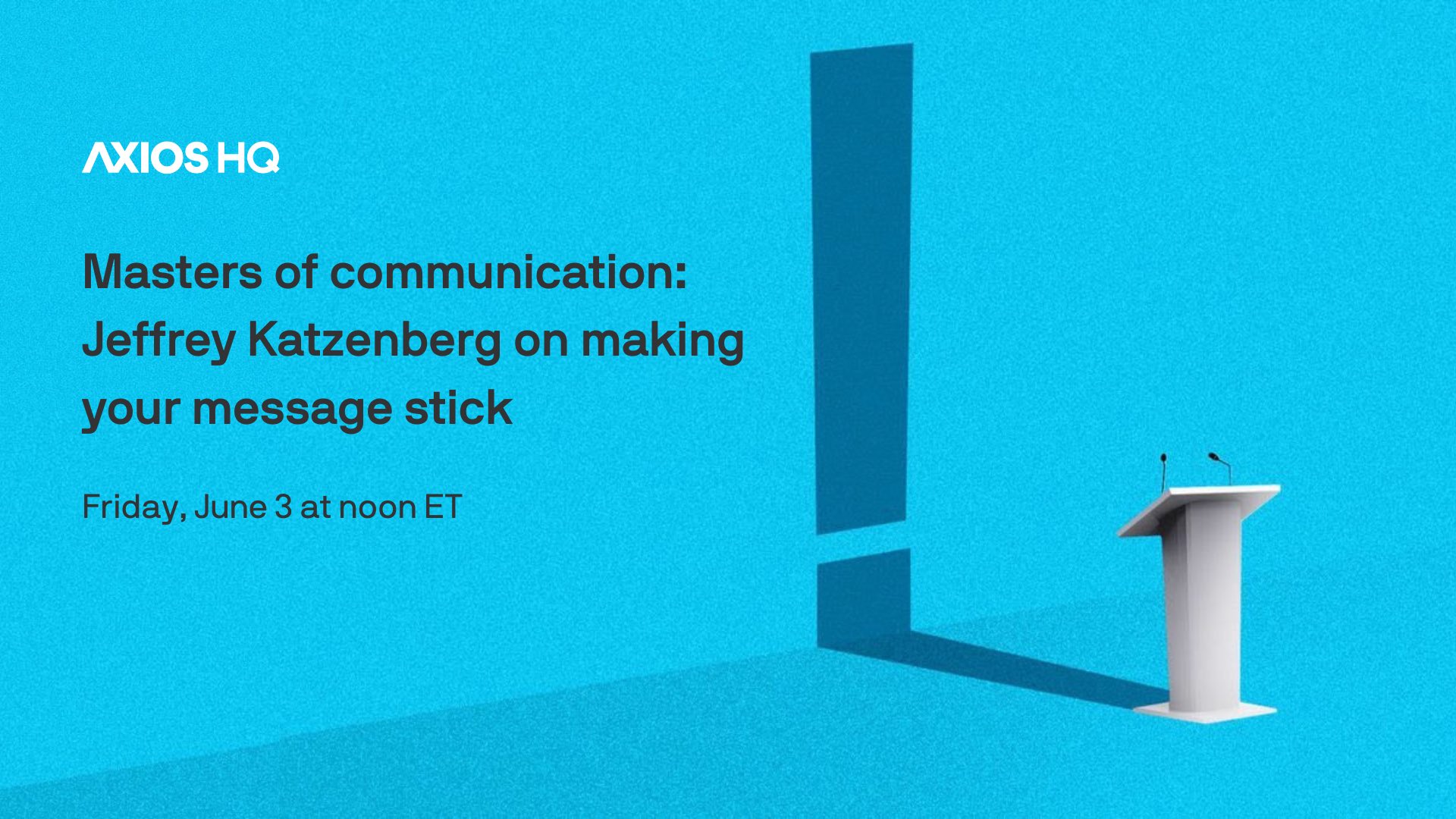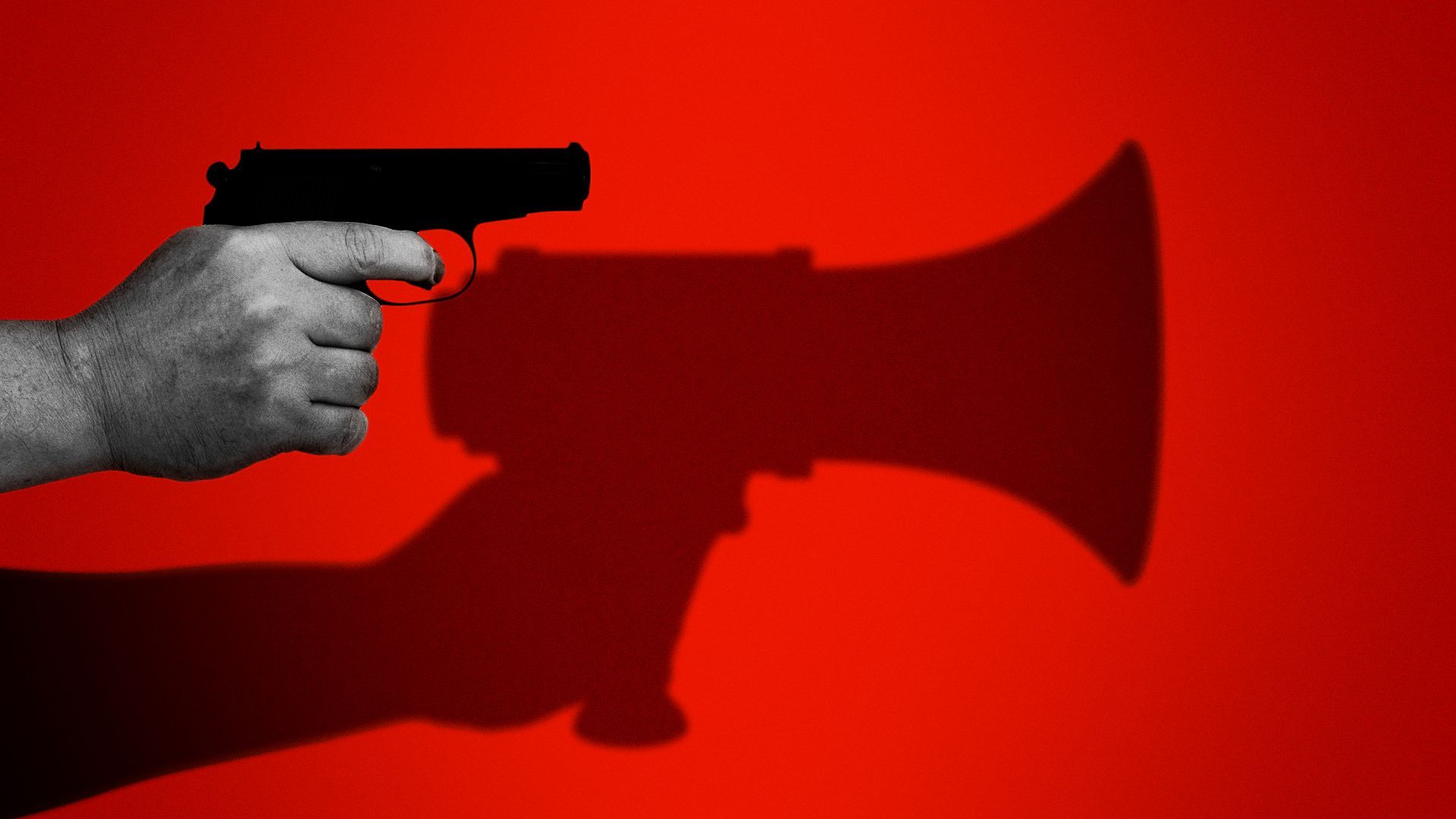| | | | | | | | | | | Axios Media Trends | | By Sara Fischer · May 31, 2022 | | Today's Media Trends is 1,470 words, a 5½-minute read. Sign up here. 🇫🇷 Email me if you're heading to Cannes. Sign up for Axios events. | | | | | | 1 big thing: Forbes SPAC deal looks dead |  | | | Illustration: Annelise Capossela/Axios | | | | The blank check company that's looking to take Forbes public has until end of business today to file paperwork with the SEC to close its merger. Why it matters: If no paperwork is filed, either party can walk away from the deal. Given the current state of the SPAC market, that looks likely. - Magnum Opus, the SPAC that's looking to merge with Forbes to take it public, has filed two deadline extensions so far this year. In both cases, the paperwork was filed several days prior to the deadline.
Be smart: With less than 24 hours to go, all signs point to today's deadline lapsing and the deal dying. - If it does file for a third extension, it's still a grim sign for a deal that was meant to close in Q1.
Next steps: There've been some signs that Forbes' management has been eyeing other options as the SPAC market skids, including a private buyout. - In December, Axios reported that a private investment firm was working on a buyout bid for Forbes at a $620 million valuation. (Forbes first said it planned to go public via a SPAC merger last August at an enterprise value of $630 million.)
- In February, Forbes received a $200 million investment from Binance, one of the largest cryptocurrency exchanges. Binance's investment would replace half of the $400 million initially raised by institutional investors to help finance Forbes' SPAC.
- The Binance deal would essentially help Forbes' owners partially exit from its investment. Forbes' primary owner, a Hong Kong-based investment group, has been trying to cash out for years.
What to watch: In the past, Forbes has reiterated its commitment to its SPAC deal, but it didn't comment in response to this story. Go deeper. |     | | | | | | 2. Scoop: Jonas Brothers back subscription "fan club" for celebs |  | | | Photo illustration: Aïda Amer/Axios. Photo: Theo Wargo/Getty Images for iHeartRadio | | | | The Jonas Brothers are helping to launch a new subscription media company called Scriber that allows celebrities to charge their biggest fans for exclusive content via text messages. Why it matters: The goal is to bring the subscription economy to Hollywood without using Big Tech platforms as intermediaries. - By launching via SMS messaging, Scriber avoids having to pay Google and Apple app store commission fees for the subscriptions it sells.
Details: Scriber is meant for professional creators with sizable followings, like musicians, actors, athletes and influencers. - The customers being targeted are the top 1–5% of a celebrity's existing follower base, said former journalist and tech entrepreneur Brian Goldsmith, who is launching the company as CEO with backing from Nick, Joe and Kevin Jonas.
Yes, but: For celebrities with tens of millions of followers, a small subset of super fans can still be incredibly lucrative. - If just 1% of the Jonas Brothers' combined 50 million Instagram followers subscribed to the Jonas Brothers' Scriber account for a year, the trio would make $30 million.
- "We love surprising the fans with secret shows and special events, and Scriber provides an easier way for our fans to get access. It's a win-win," Joe Jonas said in a statement.
How it works: Celebrities can choose how much to charge fans monthly to receive exclusive content. (The Jonas Brothers, for example, will charge subscribers $4.99 monthly.) - Scriber will charge all celebrity creators $1 per month for every subscriber that uses the service.
Share this story. |     | | | | | | 3. Exclusive: Dotdash Meredith targeting print investments |  | | | Harry Styles on the cover of Better Homes and Gardens. Credit: Better Homes and Gardens | | | | Dotdash Meredith plans to possibly add more print titles to some of its flagship brands, CEO Neil Vogel told me in an interview at SABEW's annual conference for business journalism. - Moving forward, print brands will be "smaller in circulation and much more luxury," he said.
Why it matters: For years, Meredith operated print businesses that weren't necessarily growing, Vogel explained. - "We are no longer willing to print magazines that people are no longer willing to pay for."
The strategy: Moving forward, the company will invest in print products that cater to hyper-enthusiasts. - "We're actually going to add small pieces of print — not economically relevant — to some of our other brands."
- One brand the company could eye a print investment in is Brides, which ended its print edition when Dotdash bought it in 2019.
Catch up quick: The company made the decision to cut some print titles from Meredith's portfolio in February, a few months after IAC, Dotdash's parent, acquired Meredith's magazine business for $2.7 billion last year. - It axed the print editions of EatingWell, Entertainment Weekly, Health, InStyle, Parents and People en Español.
- "We're on the other side of our major print changes," Vogel said.
Between the lines: The company has several core print titles, including People, Better Homes & Gardens, Food & Wine, Travel + Leisure, Allrecipes, and Southern Living. - "Those magazines have a viable need for print," Vogel explained. Those titles are profitable, Vogel said, and the company will continue to invest in them.
Go deeper. |     | | | | | | A message from Axios | | Masters of communication: Making your message stick | | |  | | | | Join us for a smart, brief discussion with Jeffrey Katzenberg, the creative who transformed Walt Disney Studios and built DreamWorks and WndrCo. He'll break down how leaders can use creative communication to make their visions a reality. Register to join | | | | | | 4. Uvalde captures America's fleeting attention |  Note: Includes incidents in Uvalde, Texas (2022); Buffalo, N.Y. (2022); San Jose, Calif. (2021); Boulder, Colo. (2021); Virginia Beach, Va. (2019); Parkland, Fla. (2018); Thousand Oaks, Calif. (2018); and Pittsburgh, Pa. (2018). Incidents in Buffalo and Uvalde happened less than 20 days ago; data used is most recent available; Data: NewsWhip; Chart: Jacque Schrag/Axios The shooting massacre in Uvalde garnered huge attention on social media in the immediate aftermath of the attack, but it's unclear how long that focus will last, Axios' Neal Rothschild and I write. Why it matters: The attention to the attack shows the country isn't numb to shooting tragedies — it's overwhelmed by them. Details: Data provided exclusively to Axios by NewsWhip shows a public surge of interest in the immediate aftermath, peaking above even the 2018 shooting at Marjory Stoneman Douglas High School in Parkland, Florida. - The interest, measured in social media interactions (likes, shares, comments) on news articles following Parkland, however, was sustained for a much longer period of time, as students who survived the shooting became vocal gun control activists.
The big picture: School shootings have sparked debate around gun violence more than other kinds of mass shootings. - The highest level of interest in "guns" in the past five years came after the Parkland shooting, according to Google Trends data.
- Since 2004 — the earliest Google Trends data is available — the biggest spike in discussions about "guns" came following the 2012 Sandy Hook shooting.
Interactive chart. |     | | | | | | 5. Right-wing misinformation machine revs up |  | | | Illustration: Maura Losch/Axios | | | | In the wake of mass shootings in Uvalde, Texas and Buffalo, New York, right-wing conspiracy theories moved faster than ever from fringe to the mainstream, thanks to a misinformation infrastructure that's grown stronger over time, Axios' Alison Snyder and I write. Why it matters: The pipeline of misinformation moving from obscure internet platforms to the mouths of sitting members of Congress "seems to be going a lot faster now," said Bryce Webster-Jacobsen, director of intelligence operations at GroupSense, a threat intelligence firm. Details: In the wake of the Buffalo and Uvalde shootings, several big conspiracy theories quickly took hold, with many falsely characterizing the shooter or victims to match fringe political narratives. - In Uvalde, misinformation falsely claiming the shooter was transgender appears to have quickly spread from 4chan, an anonymous message board, to the mainstream. Rep. Paul Gosar (R-Ariz.) tweeted that the shooter was a "transsexual leftist illegal alien," but he later deleted the post.
- In Buffalo, misinformation falsely claiming that the shooting was a "false flag" operation spread quickly in the aftermath of the massacre. A conservative Arizona state lawmaker is under investigation by the Arizona Senate for her Telegram post endorsing the theory.
The big picture: "Often, it strikes me that these kinds of communities or figures ... want to believe a certain thing, and someone on the internet finds something to provide source material," said Jared Holt, resident fellow at the Atlantic Council's Digital Forensic Research Lab. - "They come up with the concept first and then scour the internet to patch details in there so that it can live on."
Go deeper. |     | | | | | | 6. 1 fun thing: "Top Gun" sequel breaks records |  Data: Box Office Mojo; Chart: Danielle Alberti/Axios Paramount and Skydance's huge weekend opener for " Top Gun: Maverick" is now the biggest in Memorial Day weekend history. - It's also the first movie starring Tom Cruise to debut with more than $65 million at the domestic box office.
Why it matters: The smashing debut means we are "officially in the realm of consistent momentum, or at least in the realm of normalcy at the box office," said Comscore senior media analyst Paul Dergarabedian. - Yes, but: The box office is still down 40% year-to-date compared to 2019. (See above.)
By the numbers: The highly anticipated sequel brought in $156 million at the domestic box office as of Monday morning, per Comscore, and $252.7 million worldwide, per Paramount. - The film ousted Disney's "Pirates of the Caribbean: At World's End" as the top-performing Memorial Day opener of all time.
- The movie's older audience makes its massive debut more notable. According to Paramount, roughly 55% of the film's viewers were over 35. The first "Top Gun" movie debuted in 1986.
What's next: Heading into the rest of the summer, Dergarabedian said a slew of nonaction films are expected to do well — a hopeful sign for theaters. - "Lightyear," Disney's animated sci-fi film about the origin of Buzz Lightyear, will debut in June.
- "Nope," Jordan Peele's sci-fi horror film, will premiere in July.
Go deeper: Sign up for Axios Media Deals. |     | | | | | | A message from Axios | | Masters of communication: Making your message stick | | |  | | | | Join us for a smart, brief discussion with Jeffrey Katzenberg, the creative who transformed Walt Disney Studios and built DreamWorks and WndrCo. He'll break down how leaders can use creative communication to make their visions a reality. Register to join | | |  | It's called Smart Brevity®. Over 200 orgs use it — in a tool called Axios HQ — to drive productivity with clearer workplace communications. | | | | | | Axios thanks our partners for supporting our newsletters. If you're interested in advertising, learn more here.
Sponsorship has no influence on editorial content. Axios, 3100 Clarendon Blvd, Suite 1300, Arlington VA 22201 | | | You received this email because you signed up for newsletters from Axios.
Change your preferences or unsubscribe here. | | | Was this email forwarded to you?
Sign up now to get Axios in your inbox. | | | | Follow Axios on social media:    | | | | | |
Post a Comment
0Comments